Shop All Women’s Hair Loss Products
What Causes Female Hair Loss
Hormonal Changes
Hormones are crucial in regulating hair growth, and fluctuations can lead to hair loss. Conditions such as polycystic ovary syndrome (PCOS) and menopause are known to disrupt hormonal balance, causing thinning hair or increased shedding. Menopause, in particular, can lead to a decrease in estrogen levels, contributing to hair thinning.
Genetics
Genetic factors play a significant role in hair loss. Female pattern baldness, a hereditary condition, typically causes diffuse thinning over the crown and part of the scalp rather than distinct bald patches. It often starts subtly and progresses gradually.
Age
Aging naturally affects hair growth. As women get older, hair tends to become finer and more brittle, and the rate of new hair growth slows down. This process leads to increased visibility of the scalp and reduced hair volume.
Stress and Lifestyle
High levels of stress and poor lifestyle choices can contribute to hair loss. Stress can trigger a condition called telogen effluvium, where a large number of hair follicles enter the shedding phase prematurely. Additionally, a diet lacking essential nutrients can weaken hair and reduce its growth potential.
Medical Conditions
Various health issues can affect hair health. Autoimmune diseases, thyroid imbalances, and certain medications can lead to hair loss. It’s essential to manage underlying health conditions to mitigate their impact on hair.
Hair Care Practices
Frequent use of harsh hair treatments, such as dyeing, perming, and using excessive heat, can damage hair follicles. Adopting gentler hair care routines can help prevent further hair loss.
Types of Female Hair Loss
Diffuse Thinning
This type of hair loss is characterized by a gradual reduction in hair density across the entire scalp. It is commonly associated with hormonal changes, aging, or nutritional deficiencies.
Receding Hairline
Although less common in women than men, a receding hairline can occur, typically affecting the temples or front hairline. This type can be related to genetic factors or hormonal changes.
Alopecia Areata
This autoimmune disorder causes sudden, localized patches of hair loss. It can affect various areas of the scalp or body and may resolve on its own or with treatment.
Telogen Effluvium
This condition results in excessive hair shedding due to a disruption in the hair growth cycle, often triggered by stress, illness, or major life changes.
What Treatment Options Are Available?
When it comes to addressing female hair loss, a variety of treatment options can help restore hair health and confidence. From over-the-counter solutions to advanced procedures, understanding the available treatments can guide you in finding the most effective approach for your needs.
Regaine for Women
One of the most widely recommended treatments for female hair loss is Regaine for Women, also known as Minoxidil. This topical solution is specifically formulated to stimulate hair follicles and promote hair regrowth. Clinical studies have demonstrated its effectiveness in treating female pattern baldness and diffuse thinning. Regaine for Women works by increasing blood flow to the scalp and revitalizing shrunken hair follicles, helping to regrow thicker, fuller hair. It’s easy to use and integrates seamlessly into your daily routine, making it a popular choice for many women experiencing hair fall.
Other Topical Treatments
In addition to Regaine, there are various other topical treatments available that can help with female hair thinning. These include products containing minoxidil in different formulations and concentrations. Some may offer combined ingredients aimed at enhancing hair strength and reducing breakage.
Prescription Medications
For more severe cases of hair loss, prescription medications may be necessary. These can include oral medications like finasteride, which is used off-label for women, or hormone therapies for those experiencing hair loss due to hormonal imbalances. Always consult with a healthcare provider to determine the best prescription option for your condition.
Professional Procedures
For those seeking more permanent solutions, professional treatments such as hair implants or laser therapy can be effective. Hair implants involve transplanting healthy hair follicles from one part of the scalp to thinning areas, providing a long-term solution for significant hair loss. Laser therapy, on the other hand, uses low-level lasers to stimulate hair follicles and improve hair density.
Natural Remedies and Supplements
Natural remedies and dietary supplements can also play a role in supporting hair health. Supplements containing biotin, iron, and other essential nutrients can help strengthen hair and improve overall scalp health. While these remedies may not offer the same level of effectiveness as medical treatments, they can complement other approaches and support healthier hair growth.
Consulting a Specialist
It’s crucial to consult with a dermatologist or hair specialist to assess the cause of your hair loss and determine the most suitable treatment options. A specialist can provide personalized recommendations and help you navigate the various treatments available to achieve the best results.
How to Maintain Healthy Hair
Eat a Balanced Diet
A nutritious diet is crucial for healthy hair growth. Ensure that your meals are rich in protein, as hair is primarily made of protein. Incorporate sources such as lean meats, fish, eggs, and legumes into your diet to support hair strength and growth. Additionally, focus on vitamins and minerals like iron, zinc, vitamin D, and biotin, which are essential for hair health. Foods such as leafy greens, nuts, seeds, and fruits provide these necessary nutrients. Healthy fats, particularly omega-3 fatty acids found in fish, flaxseeds, and walnuts, also help keep your scalp hydrated and promote overall hair health.
Practice Gentle Hair Care
Adopting gentle hair care practices is essential to minimise damage and breakage. Avoid washing your hair too frequently, as this can strip it of its natural oils. Washing 2-3 times a week, or as needed based on your hair type, is generally sufficient. Choose mild shampoos and conditioners that are free from sulphates and designed for your specific hair type. Harsh chemicals can irritate the scalp and weaken hair strands, so opt for products that maintain natural moisture. Regular conditioning helps to keep your hair moisturised and manageable, reducing tangling and breakage.
Minimise Heat and Chemical Treatments
Excessive use of heat and chemicals can damage your hair over time. Limit the use of heat styling tools such as blow dryers, flat irons, and curling irons, and always apply a heat protectant spray before using these tools to protect your hair from damage. Additionally, minimise the use of harsh chemical treatments like perming, relaxing, or frequent colouring. Opt for more natural alternatives whenever possible to avoid putting unnecessary stress on your hair.
Be Gentle When Handling Wet Hair
Wet hair is more prone to breakage, so handle it with care. After washing, use a wide-tooth comb to detangle your hair gently. Avoid brushing it while wet, as this can cause breakage. Instead of rubbing your hair with a towel, which can create friction and damage, gently pat it dry to minimise the risk of breakage.
Protect Your Hair from Environmental Damage
Environmental factors can impact hair health. Protect your hair from excessive sun exposure and harsh weather conditions by wearing hats or scarves. Additionally, applying a leave-in conditioner can offer extra protection against environmental damage and help retain moisture.
Manage Stress Effectively
Chronic stress can contribute to hair loss and thinning. Engage in relaxation techniques such as yoga, meditation, or deep breathing exercises to help manage stress levels. If stress is significantly affecting your well-being, consider talking to a counsellor or joining a support group to address underlying issues.
Regular Scalp Care
A healthy scalp is essential for optimal hair growth. Regular scalp massages can improve blood circulation and promote hair growth. Use your fingertips to gently massage your scalp for a few minutes each day. Additionally, occasionally exfoliating your scalp with a gentle exfoliator can help remove dead skin cells and promote a healthier scalp environment.
By incorporating these tips into your daily routine, you can support the health and vitality of your hair, reduce the risk of damage, and encourage natural growth. Implementing these practices can lead to stronger, more resilient hair and overall improved hair health.



